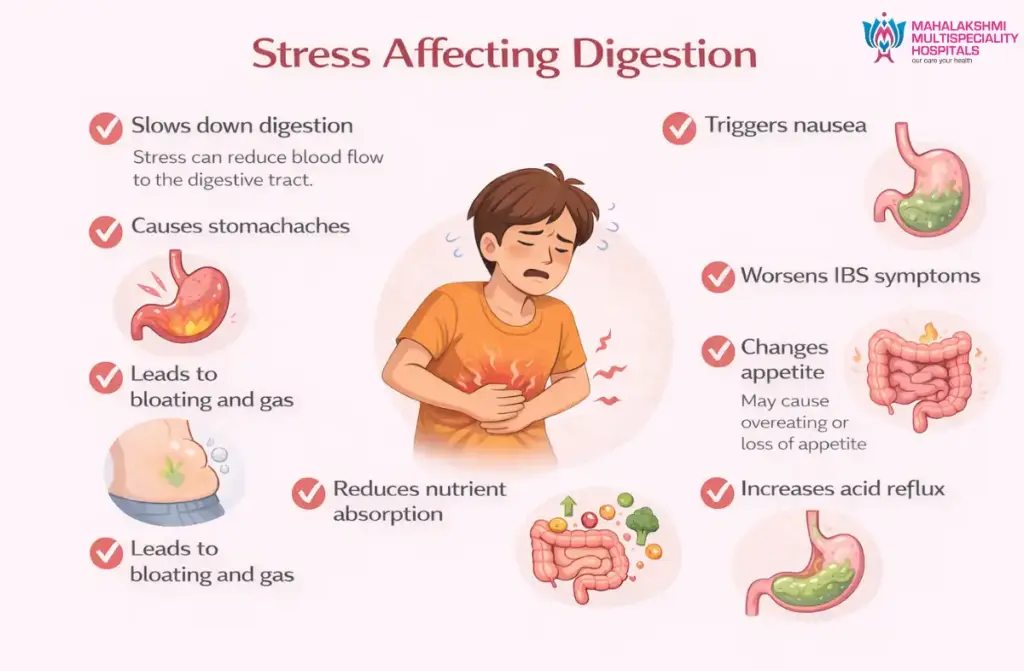Can stress cause stomach pain? Yes, stress can significantly affect your digestive system. When you’re anxious or overwhelmed, your body releases stress hormones that can trigger stomach cramps, bloating, nausea, or even diarrhea. This response occurs because the brain and gut are closely linked, often called the “brain-gut connection.” Understanding this link is key to managing discomfort and protecting your digestive health. Simple lifestyle changes such as eating balanced meals, staying hydrated, practicing mindfulness, and getting enough sleep can ease stress-related stomach pain and improve overall well-being. If symptoms persist or worsen, seeking professional guidance is highly recommended.
Why Does Stress Cause Stomach Pain and Discomfort?
Can stress cause stomach pain? When you’re under stress, your body triggers the “fight or flight” response, releasing a rush of hormones like cortisol and adrenaline to help you cope with the situation. These hormones can increase stomach acid production and slow down digestion, causing cramping, bloating, and pain. The body essentially redirects energy away from non-essential functions, such as digestion, to prepare for perceived threats.
- Understanding the mechanisms behind stress-related stomach pain helps in adopting effective coping strategies and preventive measures.
- Stress may cause the digestive tract muscles to tighten excessively, resulting in spasms and abdominal discomfort.
- Increased stomach acid during stress may contribute to heartburn or gastritis.
- Ongoing stress can aggravate conditions like irritable bowel syndrome (IBS), making symptoms more frequent or severe.
The Brain-Gut Connection
The brain and gut communicate through the enteric nervous system, often called the “second brain.” This communication explains why emotional stress often manifests as physical digestive symptoms. Can stress cause nausea and stomach pain? Stress can disrupt this signaling, resulting in pain, nausea, or irregular bowel movements.
- Recognizing this connection allows individuals to approach treatment holistically, addressing both mental health and digestive wellness.
- The vagus nerve plays a crucial role in transmitting stress signals to the gut.
- Neurotransmitters such as serotonin influence both mood and gastrointestinal function.
- A disrupted brain-gut connection can increase sensitivity to normal digestive processes, making mild discomfort feel more severe.

Do My Symptoms Improve When My Stress Levels Go Down?
Yes, many individuals notice significant improvement in stomach discomfort once stress is managed effectively. Can stress cause stomach pain and bloating? Reducing stress can normalize digestive function, decrease inflammation, and relieve cramping or bloating. Recovery may vary depending on the duration and intensity of stress exposure.
- By monitoring symptoms in relation to stress levels, individuals can identify triggers and develop personalized coping strategies.
- Practicing relaxation techniques can provide immediate symptom relief.
- Long-term stress management contributes to sustained digestive health.
- Consistency in reducing stress improves both mental and gastrointestinal resilience.
How Long Can Stress-Related Stomach Pain Last?
Stress-related stomach pain varies in duration, ranging from temporary discomfort to chronic issues. Can stress cause stomach pain? Acute stress may cause brief episodes of cramping or nausea, while ongoing stress can result in persistent gastrointestinal symptoms.
- Recognizing patterns in stress-related stomach pain allows for timely intervention and improved digestive well-being.
- Short-term episodes often resolve within hours or days.
- Ongoing stress can result in persistent or recurring pain.
- Early stress intervention can prevent long-term digestive complications.
Can Stress Cause Bloating and Diarrhea?
Can stress cause stomach pain and diarrhea? Stress frequently affects bowel habits, causing bloating, diarrhea, or constipation. Hormonal changes and altered gut motility can accelerate or slow digestion, producing uncomfortable symptoms.
- Addressing stress is essential to reduce both the frequency and severity of stress-related stomach pain.
- Increased cortisol can lead to fluid retention and abdominal bloating.
- Accelerated gut movement may result in diarrhea or urgent bowel movements.
- Chronic stress may trigger conditions like IBS, Tips to improve digestion intensifying these symptoms.
What Settles an Upset Stomach?
Managing an upset stomach during stress involves calming both the digestive tract and the nervous system. Gentle remedies and mindful practices can relieve discomfort effectively.
- Combining physical and mental relaxation methods often provides the most rapid relief from stress-related stomach pain.
- Sip warm herbal teas such as ginger or chamomile.
- Practice deep breathing or progressive muscle relaxation.
- Apply a warm compress to the abdomen to ease cramping.
Which Foods are Best to Eat when your Stomach Feels upset?
Certain foods can soothe the digestive system and prevent worsening discomfort during stressful periods. Selecting gentle, easily digestible options helps reduce inflammation and support gut health.
- Bananas, rice, and applesauce are easy on the stomach.
- Oatmeal and plain toast provide gentle energy without irritation.
- Probiotic-rich foods like yogurt can maintain a healthy gut microbiome.
- A thoughtful approach to nutrition supports recovery and minimizes the recurrence of stress-related stomach pain.
Do I Need Medical Advice If I Experience Stomach Pain Related to Stress?
Seek medical attention if your stomach pain is intense, ongoing, or occurs with concerning symptoms. Can stress cause stomach pain? A professional evaluation ensures no underlying condition is overlooked, and Gastroenterology Treatment may be recommended if necessary.
- Early evaluation can prevent complications and guide personalized management strategies.
- Consult a doctor if the pain is severe, getting worse, or accompanied by vomiting.
- Blood in stool or unexplained weight loss warrants prompt medical attention.
- A doctor may recommend tests or treatments to differentiate stress-induced pain from other gastrointestinal disorders.
Can Anxiety Cause Long-Term Stomach Problems?
Prolonged anxiety can disrupt normal digestive function and increase susceptibility to chronic conditions. Can stress cause stomach pain? Persistent stress and anxiety may lead to long-term changes in gut motility, microbiota balance, and stomach lining health.
- Recognizing the possible long-term effects highlights the importance of effectively managing stress and anxiety.
- Chronic anxiety can aggravate conditions like irritable bowel syndrome (IBS) or acid reflux.
- Prolonged stress can increase the chances of developing gastritis or ulcers..
- Managing anxiety is crucial to protect digestive health and prevent recurring symptoms.
How Do I Stop Stress-Related Stomach Pain?
Reducing stress-related stomach pain involves a combination of lifestyle adjustments, mindfulness practices, and dietary considerations. Can stress cause stomach pain? By addressing root causes, relief becomes more consistent.
- Targeted strategies can significantly reduce both the frequency and intensity of stress-related stomach pain.
- Practice daily relaxation techniques such as meditation or yoga.
- Identify and reduce specific stress triggers when possible.
- Maintain a balanced diet and hydrate adequately to support digestion.
How Do I Reduce Stress and Anxiety?
Effective stress management requires a multifaceted approach tailored to individual needs. Incorporating both physical and mental wellness strategies enhances resilience.
- A proactive approach to stress reduction fosters both mental clarity and digestive comfort.
- Engage in regular physical activity to release tension and improve mood.
- Maintain a consistent sleep schedule to support overall health.
- Utilize cognitive-behavioral strategies or mindfulness to reframe stressors.
- Prioritize social support, hobbies, and relaxation to promote emotional well-being.
Conclusion
Can stress cause stomach pain? Stress-induced stomach pain is a common yet often overlooked issue, closely linked to the brain-gut connection. At Mahalakshmi Hospitals, specialized care focuses on understanding how stress impacts digestion, helping patients manage symptoms effectively through tailored therapies, mindful nutrition, and guided lifestyle adjustments. By managing stress, you not only ease immediate discomfort but also protect your digestive health over time. With expert support and a holistic approach, Mahalakshmi Hospital empowers individuals to prevent chronic digestive issues, enhance overall well-being, and build a strong foundation for lasting health and comfort.
Read also: Best Gastroenterology Hospital in Tamilnadu






